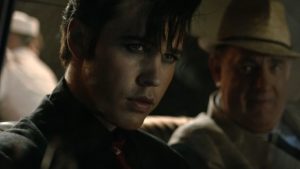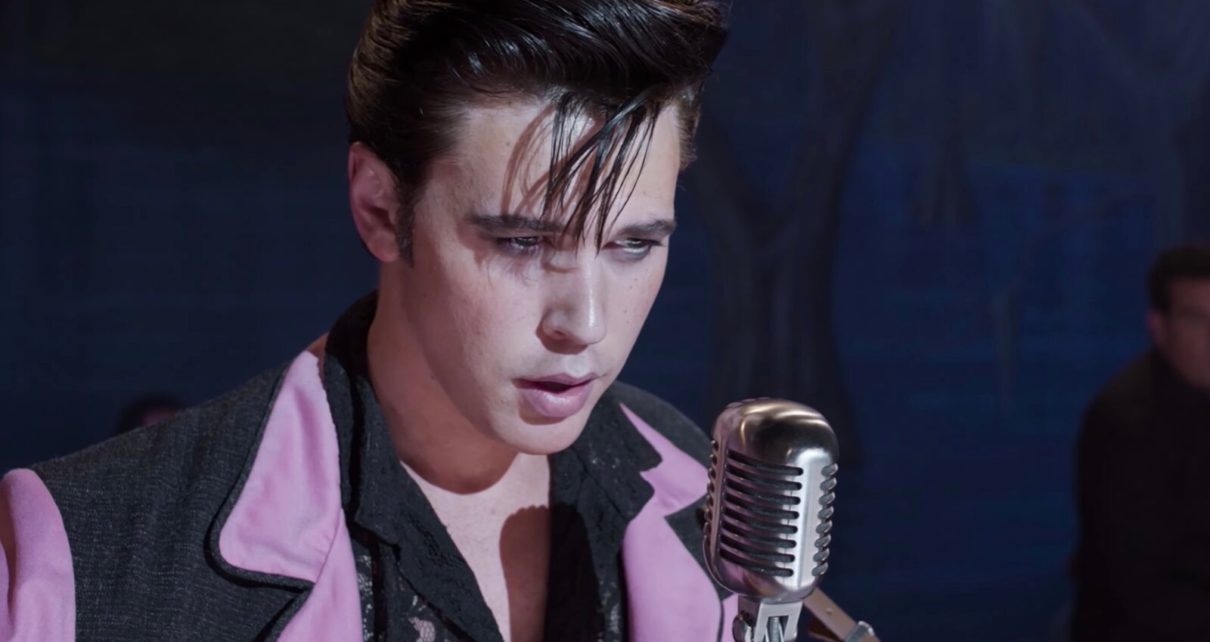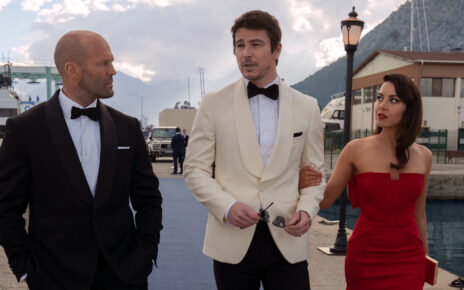I only knew fat Elvis Presley. That was the only version of The King I ever saw. People close to my age will know exactly what I’m talking about. You see, there were always two versions of Elvis: one was young and trim and hot and made women drop ladytrou with a mere wiggle. The other ate peanut butter with every meal, wore ridiculous sequined onesies, and looked like he took drugs every half hour … probably because he was taking drugs every half hour. That’s the Elvis I knew. Austin Butler is a fantastic representation of young Elvis … but the man needed a ton more makeup than he got in this film to get to the 1970s version.
Writer/director Baz Luhrmann set out to answer the question: “Was Colonel Tom Parker (Tom Hanks) a villain?” We already know how Baz feels about The King. This may not be the very most forgiving portrait of Elvis that ever existed, but it ain’t far off. Watch Act III and you’ll see Baz consistently sugar-coat the Elvis short comings – his drug abuse, his indulgences, his estrangement of wife and child. Our question is: “Do we forgive Elvis?” Of course we do; he’s The King.
Do we forgive Colonel Tom Parker? That’s a better question. “Colonel” “Tom” “Parker,” Elvis‘ other half, took way far large a cut for his managerial role –although Elvis Presley collecting 50% of the profits seems HUGE by the standards of today’s artists. The Colonel almost certainly stole from Elvis, the Colonel’s vision for Elvis the performer verged several times on too conservative –even by the standards of the time—and when Las Vegas was invented, Colonel Parker locked songbird Elvis in a gilded cage at The International. But he gave the world Elvis, which is no small feat. Elvis Presley has now been dead for nearly fifty years and he’s still a household name in billions of households. Do we really think his promoter stifled him or his career?
The screenplay wasn’t terribly interested in the pre-Colonel version of Elvis. Oh, it did trace his superhero origin story back to rural Mississippi and his love for comic books and gospel. One of the early themes the film attacks is Elvis being mistaken a black performer in both sound and movement. Such is enhanced by Elvis’ habitual visitation of Beale Street in Memphis where we get to see him hang out with B.B. King and Little Richard. So we see his influences, but we never investigate his transition from church choir to his first record.
What we get instead is probably better, for Colonel Tom Parker recognized immediately the power of an Elvis performance, which –impossible as it may seem- outshone the power of his voice. Personally, I’ve only seen women swoon over a performer they’d never seen once in my lifetime. And it wasn’t so much a swoon as a: “Wow. It’s like I’m not even here.” It’s different from a genuine swoon in that there’s no outward action taken. Women SWOONED for Elvis. Women who had never seen him before marched right in front of him and thrust whatever bodypart that he could touch in front of him. Sure, maybe the 1950s South was a tad repressive and there was a lot of pent-up repression that needed release. Still, when  you get to the point that women throw panties on the stage for you? That’s a pretty good sign of popularity – to put it mildly. Colonel Tom recognized this immediately and took advantage.
you get to the point that women throw panties on the stage for you? That’s a pretty good sign of popularity – to put it mildly. Colonel Tom recognized this immediately and took advantage.
IMHO, Austin Butler can’t get enough praise for this performance. He looks like Elvis. He sounds like Elvis. He moves like Elvis. He … thinks like Elvis. This is a magnetic performance to boot. And yet, this is all window dressing. The real film here is the on-again, off-again relationship between the country superstar and the man who put him on the map. The best scene in the film exemplifies this relationship perfectly: Elvis is delivering the first of what will be years and years of performances at The International in Las Vegas. The song is “Suspicious Minds” and as Elvis repeats the lyric, “we’re caught in a trap,” Colonel Tom is in the audience signing away Elvis’ future on a napkin.
There were far too many things to like about Elvis to pan the film. The performances were dead on. The recreations of Elvis’ history were –far as I can tell- very faithful. And though the film does deliver The King is an almost entirely positive light, I don’t necessarily see that as a detraction. If we sugar-coat Elvis, it’s because we need to sugar-coat Elvis; he meant a great deal to millions and millions and millions of people. He means a great deal to millions and millions and millions of people. OTOH, I rarely accuse a musical of having too much music – but that’s a little of how Elvis feels. More than once, the interlude soundtrack ate into a performance that I wanted to see from the start. It’s also fairly clear that Baz Luhrmann wanted to make another Moulin Rouge! The problem? The story of Elvis doesn’t have quite the passion or pathos; sure, the death of a king is always a tragedy … but you want it to be at the hands of Brutus or Cassius, not a peanut butter ‘n’ Demerol sandwich.
♪Con men say
“If they’re fools, we’ll win”
But I can’t help making this kid my coup
Shall fair play
Lead to self-chagrin?
No, the King forever will be my revenue
Like the sewer flows
To a sludge quarry
Grift? That’s how it goes
Some things were meant to be♫
Rated PG-13, 159 Minutes
Director: Baz Luhrmann
Writer: Baz Luhrmann, Sam Bromell, Craig Pearce
Genre: Viva Las Vegas!
Type of being most likely to enjoy this film: Are You Lonesome Tonight?
Type of being least likely to enjoy this film: Suspicious Minds
♪ Parody Inspired by “Can’t Help Falling in Love”



